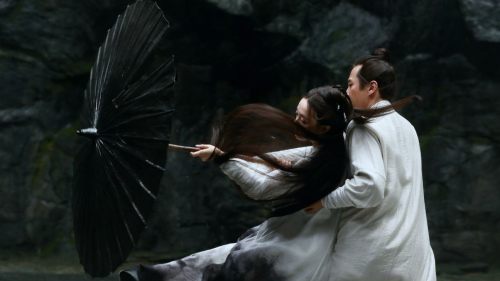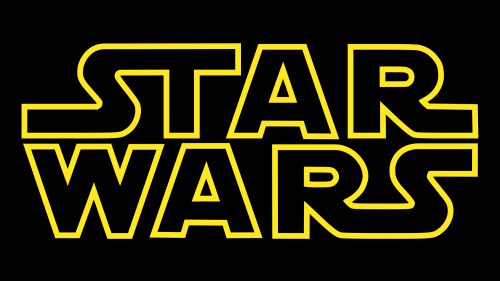SOLO: Star Wars As Big Screen Fan Fiction
***Caution: Spoilers For Solo Ahoy***
We're three years into Disney/Lucasfilm's re-launched Star Wars programming, having received a new tale – be it a chapter in the latest "trilogy" (JJ Abrams' The Force Awakens, Rian Johnson's The Last Jedi) or the stand-alone "stories" (Rogue One, Solo) – every calendar cycle since '15. This inundation of IP is so thorough – building on Marvel’s expanded universe model – that it’s somewhat easy to forget there was a sixteen-year gap when we didn’t receive any sort of Star Wars on the big screen before The Phantom Menace arrived in ‘99. Sure, there was a smattering of small screen installments – two Ewok TV movies (Caravan of Courage and The Battle For Endor) being the most prominent examples – but for the most part, George Lucas' adventures in a galaxy far, far away were left up to our imaginations to continue.
Nevertheless, that didn't stop scores of authors from penning their own Jedi texts; tomes to be separated into canon and non-canon alike. Role-playing games were established in expensive, hardback rulebooks that would make the average Dungeonmaster swoon. Short story compilations were edited by authors like Kevin J. Anderson (The Jedi Academy trilogy), and comic book series like X-Wing Rogue Squadron were inked. Outside of these professional publications, the inception of the Internet allowed amateur authors to start digitally scribbling their own takes on this intergalactic mythology (peruse the archives here). Though this author doesn't have any sort of quantifiable data in front of him, it still feels like a safe assumption to say that – out of all the franchises in pop culture history – none have been expanded upon in the absence its creator quite like Star Wars (except for maybe Star Trek?). It's a credit to Lucas and the rest of the series' visionaries that these sorts of digressions – both authorized and unauthorized – were voluminous in number, as these characters and intergalactic environments set fans' brains on fire.
Unfortunately, with this sort of fervent admiration, creation and consumption comes the price tag of presumed fan ownership. While most of these novels were providing further stories for the devoted to explore while desperately hoping Lucas would eventually announce a new movie, they mostly filled in back stories, added shades and new character elements to the canon, and provided the blueprints for a galaxy that stretched far beyond where its initial inventor intended for it to go. An attachment to these place-holders was created, as the tone and focus they provided became just as ingrained in admirers' heads as the original slices of cinema. Thus, their essential place in the hearts of the hardcore also cemented a certain resistance to change. Stories in the Star Wars universe were expected to fall in line and adhere to what came before, not buck against expectations in any grand fashion. To be fair, this attitude isn't an anomaly in fandom – just look to continuity-obsessed horror nerds for a great companion collection – yet the texts heightened this entrenched outlook.
Cut to '17 and the rather violent reaction certain circles of Star Wars fans had to The Last Jedi. BMD has explored this phenomenon in depth via James Emanuel Shapiro's examination of the manipulation of that movie’s Rotten Tomatoes audience scores, while Andrew Todd succinctly summed up what some SW junkies took issue with in his rather superlative piece, "Unlearning What We Have Learned":
"The Last Jedi is the first film in an age to meaningfully expand this fictional universe, and the first to truly follow through on The Empire Strikes Back’s ethereal ideas around the Force. Far from retreading empty nostalgia, it opens up new horizons, twisting familiar situations to communicate something fresh and exciting. It’s the most mystical movie in the series so far, yet also absolutely about demystification - serving almost as a rebuttal to (in particular) The Force Awakens’ ideas about legends and storytelling."
For those interested in Star Wars continuing to expand its mythos and perhaps even re-write them in the name of pushing the franchise into more progressive-minded territory, The Last Jedi was a breath of fresh air. For others looking for another nostalgic retread of the past with some new character trivia thrown in for good measure (essentially the filmic equivalent of those old '90s pieces of expanded universe pulp), Rian Johnson's picture was an enraging 2.5 hours. Here was a movie where a character verbalizes the themes ("Let the past die. Kill it, if you have to") before Luke burns down the ancient Jedi texts (while Yoda simultaneously disses them: "page turners, they were not"). It was Johnson signaling that the franchise was going to be untethered to its roots, willing to grow and venture into uncharted territory (especially once he started developing the next trilogy).
Solo: A Star Wars Story seems tailor-made for the latter group mentioned in the last 'graph. Instead of re-mapping the cosmos, it's operating purely as ”gap filler", letting us know how Han Solo (Alden Ehrenreich) obtained his last name, met Wookiee wing man Chewbacca (Joonas Suotamo), first laid eyes upon the Millennium Falcon, and met gambling smuggler extraordinaire, Lando Calrissian (Donald Glover). Hell, it even contains a line of dialogue where Han decides that Chewbacca "needs a nickname", and references an upcoming job "for a big time gangster on Tatooine". Unlike The Last Jedi, it’s a series of cute winks to fans, as if letting them know that Disney/Lucasfilm are still here to satiate their burning hunger for Star Wars minutiae, allowing them to assemble the very best bar trivia teams of all time.
Even at a performance level, Ehrenreich and Glover are doing approximations of how we remember Han and Lando. Ehrenreich's especially dire; a sort of wooden, pretty boy Harrison Ford impersonation, saying the lines with minimal conviction and hoping that his charming, outlaw get up will compensate for the fact that he's doing little with the character beyond hitting his marks and tossing out a few come hither eyebrow raises. Unlike Chris Pine's take on Captain James T. Kirk in Abrams' Star Trek revival – which feels like the closest point for a 1:1 comparison of young actors rebooting iconography (though, in fairness, those movies take place in an alternate timeline from the OST) – Ehrenreich does nothing to truly make the character his own. Glover's turn is mildly better (though those clamoring for a Lando picture might be overreaching), but even his "pansexual"* iteration becomes a human cape rack, all smooth Billy Dee Williams line delivery as he teasingly butchers the pronunciation of Han's name.
Perhaps most disturbing of all is how Solo treats its women, who are either offed to add “depth” to their male counterparts, or simply inserted into the narrative to act as motivation for these same central men of action. Jonathan and Lawrence Kasdan’s screenplay applies a “boys club” approach to storytelling that flies in the face of Johnson’s strong female character building. When Han joins up with a band of thieves – led by lovers Beckett (Woody Harrelson) and Val (Thandie Newton) – to pull an icy Conveyex train heist, Val is quickly dispatched in a moment of self-sacrifice, while Beckett survives to mourn her loss. A similar fate is handed down to Lando's spunky droid L3-37 (Phoebe Waller-Bridge), who’s destroyed during a daring escape set piece, only to be uploaded into the Falcon as a navigational port, never to be heard from again (the implications of which require a whole new essay to explore). Even Han's criminal love Qi'ra (Emilia Clarke) is merely offered up as a beacon for Han to return to, after the two are separated on their home sewer planet Corellia, only to betray him in Solo's climactic moments.
One of the main fan criticisms lobbed at The Last Jedi was that it contained some sort of "SJW Agenda" that threatened a portion of its developmentally stunted male base (to the point that these doofuses are making hilarious "Boycott Solo" videos). This ire was drawn because Johnson's movie featured exceedingly rounded female characters – from Rey (Daisy Ridley) to Vice Admiral Holdo (Laura Dern). Qi'ra is the closest Solo gets to duplicating these mighty women, but even her final act of betrayal feels like a wrongheaded illustration of how our male hero can never trust anyone but himself. We're a far cry away from "I love you"/"I know", with the Kasdans’ script sending our rascally rogue off into space with the woman’s memory to float him through further adventures, until eventually ending up with General (not “Princess”) Leia all those years later (presumably after eventually showing down with Qi’ra over her illicit alliances).
Major Spoiler Alert: Qi'ra's betrayal also occurs during one of the most egregious moments of fan service, as she communicates with the secret leader of the "Crimson Dawn" (hurr hurr) criminal organization: Darth Maul (once again played by stuntman/actor Ray Park). In a true instance of "you gotta read the books" multimedia universe connection, we learn that The Phantom Menace villain – who has been a major canon player in animated series The Clone Wars and Rebels – will now (again presumably) be the big bad in these continued Solo cinematic shenanigans, waiting in the wings to wield his double-ended lightsaber. A quick search explains how he survived being cut in half during the prequel’s famous duel:
"After his run in with Obi-Wan (Ewan McGregor) on Naboo, Maul clung onto life before being dumped on Lotho Minor, feeding on vermin and constructing sweet mechanical spider legs. Eventually teaming up with his brother Savage Opress, and handed a more practical pair of cybernetic legs, Maul went on to form the Shadow Collective – an alliance of criminal syndicates (including the Pyke Syndicate, Black Sun and Hutt Clan, which may or may not be three of the five syndicates mentioned in Solo) and take over Mandalore. This attracted the attention of Darth Sidious, who killed Savage Oppress and took Maul captive, only for the Sith Lord’s former apprentice to escape and flee into the night."
Solo takes place years after all this occurs, and now Maul is again head of the mafia. But the character's appearance is another cutesy nod to the devoted, itching to revisit material they were already familiar with. It's a very strange bit of universe shrinking, as Ron Howard's movie – much like Rogue One did with A New Hope during its finale – feels this need to connect back to other pieces of the franchise, despite being labeled as a stand-alone. It’s fiction made only for fans, obsessed with the past instead of adhering to The Last Jedi's ethos of looking toward the future.
In fairness, we probably should've expected this following the rather noisy outcry from a niche part of the Star Wars population. Disney and Lucasfilm are here to build a universe, and one of the key components to that construction is undoubtedly going to be keeping the overzealous placated. Yet this seems to come at the cost of actually making an interesting movie. Nothing about Solo feels fresh. Nothing about Solo feels exciting. Instead, it's an IV drip into the nostalgia receptors of our consciousness, transporting us back to the era where we never knew if there was going to be another movie. Back then, it was a "beggars can't be choosers" market, and fans would take what they could get. Nowadays, Solo feels like a step back from the radical province The Last Jedi explored. In short, why should we settle for flimsy reminiscences when we've already glimpsed the revolution?
*The definition of which is (very) loosely interpreted in the text, via his possible intimate relationship with droid L3-37.



